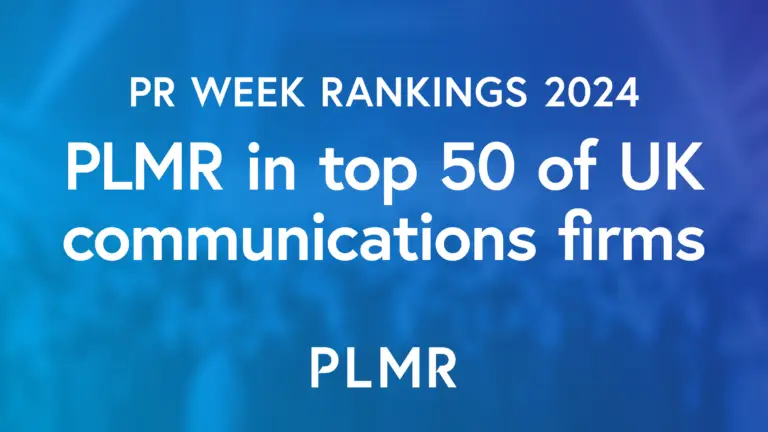With National Careers Week 2023 wrapping up, Victoria Cameron, Senior Account Director in PLMR’s Education Practice, reflects on the growing importance of careers education and advice.
As we continue to emerge and rebuild from the pandemic, and also navigate and re-invigorate the UK’s economy in the face of the cost-of-living crisis, never has the ability to equip young people with the knowledge, confidence, skills and importantly, the opportunities, to move into meaningful employment been more important.
This is also demonstrated by greater political focus on careers education and preparedness across all levels of education, from Ofsted’s assessments of how well curriculum is planned to support the knowledge and skills for future learning and employment and how schools raise pupils’ aspirations, to the Government’s emphasis and scrutiny of graduate outcomes and the earning potential of degrees. Of course, in the background to this, there is also the connection to how careers education can support social mobility – improving awareness of the opportunities available to young people and ensuring they are empowered to move into meaningful employment that sets them up for long-term success.
Ensuring a robust careers advice and preparedness strategy must be collaborative and joined-up across the sector, and so to maintain the enthusiasm generated by National Careers Week, our team has drawn inspiration from our clients to share some ideas on how to strengthen careers education and advice, raise aspirations, widen access and inspire young people about the careers of tomorrow – throughout the year.
Early years and primary
Opening pupils’ eyes to the endless opportunities before them needs to start from a young age and should, where possible, also challenge stereotypes.
In 2019, Danesholme Infant Academy, part of Greenwood Academies Trust, was the first school in the country to win the Career Mark Primary Award for developing careers skills and awareness amongst the youngest children, and they achieved this by starting to expose their pupils to a range of careers in their early years provision. This included inviting chefs, musicians, wildlife workers, dentists and emergency service professionals into the classroom and also putting pupils’ creativity to the test to see who could earn the highest profit margin from an initial investment of £20.
This work continues year-round across the Trust, but across the primaries this week, the Trust has championed ‘hidden’ jobs. While police officers and doctors will forever be popular for school visits, the Trust is encouraging some of its youngest pupils to think outside the square, hosting information sessions with the likes of a female engineer and a musician from The Scots Guard.
The Trust has also tasked primary pupils with the challenge of reflecting on jobs that didn’t exist 15 years ago (think along the lines of social media influencers and podcast producers) and to then design a job they think could exist 15 years from now. It’s a great way to start developing an understanding of how the need for skills evolves and also embrace their creativity.
Secondary
Careers Fairs are another great way to support students as they start to consider their next steps in education or the world of work, and this year Dartmoor Multi Academy Trust launched its first regional careers fair. Working with local businesses, the Fair, designed for more than 2,500 students in years 9-12 featured more than 100 trade stands, a programme of speakers, bespoke sessions for SEND students and an open evening for parents.
Further education
Apprenticeships are an impactful way of not only setting young people up for success – creating opportunities and access to a wide range of employers and fields but also enabling people to earn while they learn. Close collaboration however, between further education providers and employers is critical if we are to ensure learners are gaining in-demand skills. This is why The St Martin’s Group was founded – to increase participation in the workforce and ensure employers are at the heart of the skills system, and throughout the week has been celebrating with its members, like the NHS Trust, to showcase the more than 350 career pathways that could be taken within the organisation.
Additionally, education charity, NCFE has been placing an emphasis on raising awareness of vocational routes available, particularly amongst schools – appreciating that teachers and careers advisors are more confident and well-versed in supporting university applications than they are those for further education, a challenge that needs to be overcome if we are to see greater parity between the sectors.
Higher education
In light of the cost-of-living crisis, we’ve recently seen stories emerge about young people choosing to pursue other routes to higher education (HE) due to concerns around fees and the longer-term outcomes and benefits of degrees. This will be an ongoing challenge for the sector at large, particularly as it tries to improve access to HE amongst disadvantaged groups who will be most affected by economic pressures.
The University of Chester has a keen interest in supporting social mobility and widening access to higher education, and as such has introduced a number of initiatives to better prepare students for the workplace and ensure all young people are set up for success. This includes introducing an anonymous application process for its work experience programme.
In doing so, the University’s Careers and Employability Service moved away from using a traditional CV and cover letter recruitment process, to an anonymous application process that put ‘what a student could do now and how they could develop’ above ‘who they were and what they have done’. By flipping this system to bring students’ potential to the fore, the University has seen a reduction in unconscious bias and an increase in some of its most under-represented student groups applying for these valuable workplace experiences that can provide a great start for their careers. It’s also an initiative that was recognised for its impact, winning the Association of Graduate Careers Advisory Service’s Award for Excellence.





